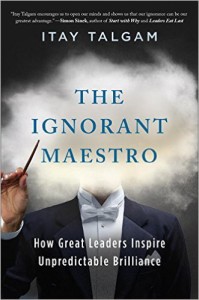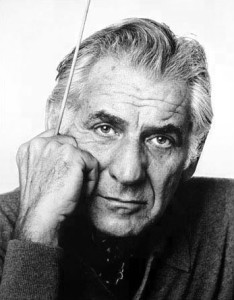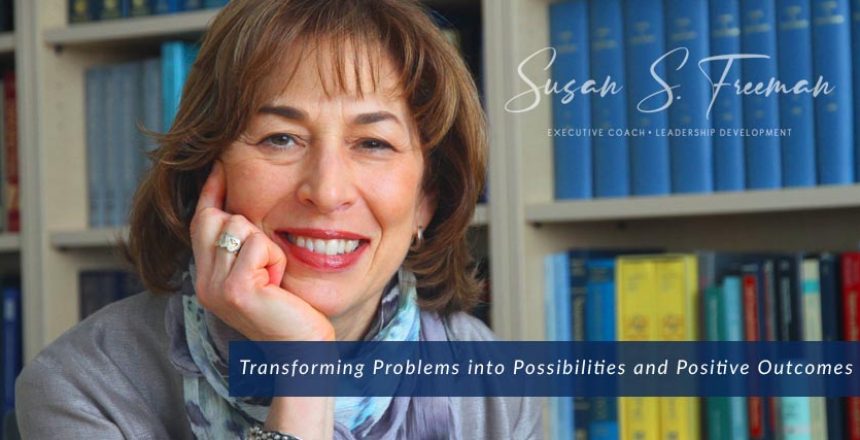 Recently the topic of ignorance has caught my eye. Not ignorance that comes from a lack of knowledge, but rather from a desire to be open to what’s new and possible. Leading Blog reviewed a new book by Itay Talgam on the topic called The Ignorant Maestro, and Jamie Holmes wrote a New York Times op-ed piece imploring “The Case for Teaching Ignorance.”
Recently the topic of ignorance has caught my eye. Not ignorance that comes from a lack of knowledge, but rather from a desire to be open to what’s new and possible. Leading Blog reviewed a new book by Itay Talgam on the topic called The Ignorant Maestro, and Jamie Holmes wrote a New York Times op-ed piece imploring “The Case for Teaching Ignorance.”
How can ignorance be applied to helping leaders become more effective? It has to do with instilling curiosity as a value. “The more we know, the more we can ask. Questions don’t give way to answers so much as the two proliferate together. Answers breed questions. Curiosity isn’t merely a static disposition, but rather a passion of the mind that is ceaselessly earned and nurtured.”
Leaders should always be learning. What happens when you don’t know what you don’t know and are ok with that? Lots it turns out.
[notification type=”alert-info” close=”false” ]
[/notification]
Learning how to let go of knowing—leading and living in curiosity could help you become an even better leader. In The Ignorant Maestro, Talgam explores the connection between leadership and conscious ignorance. When combined with a willingness to explore the gap as well as deep listening, others can fully express themselves. This allows for innovative exploration of the gaps between what’s always been done, and what’s possible in the future.
“Gaps are the renewable fuel of new thinking, enabling change. Gaps exploration, around your organization’s leading values and ideas, is a great sustainable energy source.” You explore gaps by “choosing to be ignorant, and by listening from the unique perspective of ignorance.”
The Study of Ignorance
 What does this mean in practice? “Talgam looks at the leadership styles of six great conductors in terms of how each of them did or do embrace ignorance, explored gaps and listened. In terms of leaders creating a connection with those they lead, the example of Leonard Bernstein is instructive. For Bernstein it was not a nicety but a necessity.”
What does this mean in practice? “Talgam looks at the leadership styles of six great conductors in terms of how each of them did or do embrace ignorance, explored gaps and listened. In terms of leaders creating a connection with those they lead, the example of Leonard Bernstein is instructive. For Bernstein it was not a nicety but a necessity.”
He had a habit of spending the first 30 minutes of rehearsal engaging with all the musicians, interacting, connecting, listening and learning. He demonstrated a caring relationship for the people who were about to give their all to him. The result; empathy and trust became the foundation for high performance music-making.
Why is ignorance being studied now? Holmes states “people tend to think of not knowing as something to be wiped out or overcome, as if ignorance were simply the absence of knowledge. But answers don’t merely resolve questions; they provoke new ones.” It seems that rather than running to the comfort of certainty, we should embrace the shadow of ambiguity.
Embracing Ignorance
It turns out that the study of ignorance-or agnotology- has even become a new multi-disciplinary field. “Giving due emphasis to unknowns, highlighting case studies that illustrate the fertile interplay between questions and answers, and exploring the psychology of ambiguity are essential. The time has come to view ignorance as “regular, rather than deviant,” according to sociologists Matthias Gross and Linsey McGoey.
[well type=””]Consider the possibility of how you can employ more ignorance at work.
- Begin with the end in mind—what would you like to have or be different?
- What do you want to start doing?
- What do you want to stop doing?
- If this is entirely new to you, what’s one small step you can take to try it out?
- How will you obtain feedback to see the impact?[/well]
Try becoming comfortable with curiosity; ignorance can help you lead to new heights if you’re willing to step up.
We invite you to post your comments here. To learn about other surprising ways to enhance your leadership, download my complimentary audio here.

